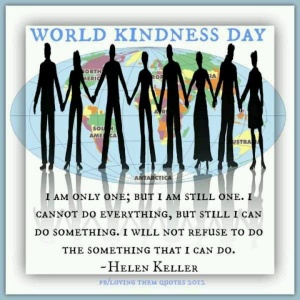What or who inspires you? To start, this is what I mean when I ask that question.
For now, let us work with the definition of inspiration as the a particularly wonderful flow of energy that comes about and moves through us when we are in tune with a level of our selves that is above and beyond our ‘normal’, ‘everyday’ selves. It is the energy that we ignite when we are tuned into our higher selves.
I hope that each and every one of us can relate to a time in our own lives when we experienced this ‘higher level’ of energy; a flow of a force or drive that, for a lack of other ways to describe it, put goose bumps on our insides and gives us a tingly type of feeling from the inside out.
When I am inspired, I function on a different plane or level that I am not always able to replicate or unfortunately hold onto for very extended periods of time. It is a wonderful feeling, exhilarating and exciting and sort of like a bubbling inside, that keeps me writing faster, moving faster, thinking faster and most significantly, bursting with creativity.
Some of the things that tend to inspire me most are:
• Music – I even have certain songs or tunes or artists that inspire me most at specific times
• Writing – There are times when I start out without feeling inspired, but as I continue writing, I begin to become inspired by the actual experience of creating
• Accomplishing Something Challenging – Whenever I try something I think might be difficult for me or new and achieve it successfully
• Personal Stories – Learning about obstacles and personal victories of others
I want to post some of the most inspiring stories that I find about people who are doing things in their lives that inspire other people – that accomplish things or face challenges that can help others want to do more and be more in their own lives too.
And, I can’t think of a better time to do it than toward the beginning of the time when many of us may have already stared the reality of our own humanity in the face because we’re almost two weeks into the 2014 and most likely, have already experienced some type of feelings of not being ‘good enough’ or having failed at our attempt to achieve a goal.
It seems to me that people who provide inspiration to others achieve something quite amazing because it is like providing a sense of immortality to their accomplishment. In essence, what they have done is breath new life and energy into another person so they now can do something else that inspires someone else. They have fulfilled an extremely wonderful calling, by sharing more than their accomplishments, they also share the energy and the ‘spiritual’ component that exists only through the inspiration they stirred.
It is like planting a garden full of new potential and possibility for what might be. It is hopeful, joyful and a gift beyond words!
ABOUT THE AUTHOR:
Judy is a licensed clinical social worker and has worked extensively as a counselor with children, adolescents, couples and families. Judy’s professional experience in the mental health field along with her love of writing, provide insight into real-life experiences and relationships. Her fresh voice and down-to-earth approach to living a happier, more meaningful life are easy to understand and just as easy to start implementing right away for positive results!












 I do not believe Druckerman was writing a book on human development, but to a social worker, it seems her observations directly relate to why so many American adults seek
I do not believe Druckerman was writing a book on human development, but to a social worker, it seems her observations directly relate to why so many American adults seek 



